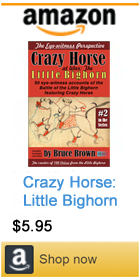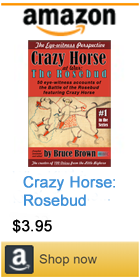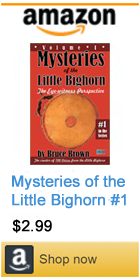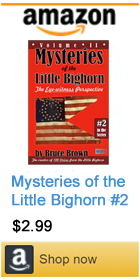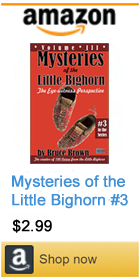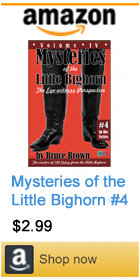|
||||||||||||
Bruce Brown's 100 Voices... Two Moon's Story of the Battle, #1
By HAMLIN GARLAND AS WE TOPPED THE LOW, pine-clad ridge and A looked into the hot, dry valley, Wolf Voice, my Cheyenne interpreter, pointed at a little log cabin, toward the green line of alders wherein the Rosebud ran, and said: "His house -- Two Moon." As we drew near we came to a puzzling fork in the road. The left branch skirted a corner of a wire fence, the right turned into a field. We started to the left, but the waving of a blanket in the hands of a man at the cabin door directed us to the right. As we drew nearer we perceived Two Moon spreading blankets in the scant shade of his low cabin. Some young Cheyennes were grinding a sickle. A couple of children were playing about the little log stables. The barn-yard and buildings were like those of a white settler on the new and arid sod. It was all barren and unlovely -- the home of poverty. As we dismounted at the door Two Moon came out to meet us with hand outstretched. "How" he said, with the heartiest, long-drawn note of welcome. He motioned us to be seated on the blankets which he had spread for us upon seeing our approach. Nothing could exceed the dignity and sincerity of his greeting. As we took seats he brought out tobacco and a pipe. He was a tall old man, of a fine, clear brown complexion, big-chested, erect, and martial of bearing. His smiling face was broadly benignant, and his manners were courteous and manly. While he cut his tobacco Wolf Voice interpreted my wishes to him. I said, "Two Moon, I have come to hear your story of the Custer battle, for they tell me you were a chief there. After you tell me the story, I want to take some photographs of you. I want you to signal with a blanket as the great chiefs used to do in fight." Wolf Voice made this known to him, delivering also a message from the agents, and at every pause Two Moon uttered deep-voiced notes of comprehension. "Ai," "A-ah," "Hoh,"-these sounds are commonly called "grunts," but they were low, long-drawn expulsions of breath, very expressive. Then a long silence intervened. The old man mused. It required time to go from the silence of the hot valley, the shadow of his little cabin, and the wire fence of his pasture, back to the days of his youth. When he began to speak, it was with great deliberation. His face became each moment graver and his eyes more introspective. "Two Moon does not like to talk about the days of fighting but since you are to make a book, and the agent says you are a friend to Grinnell (George B. Grinnell, whom the Cheyennes, Blackfeet, and Gros Ventres love and honor), I will tell you about it-the truth. It is now a long time ago, and my words do not come quickly. "That spring [1876] I was camped on Powder River with fifty lodges of my people -- Cheyennes. The place is near what is now Fort McKinney. One morning soldiers charged my camp. They were in command of Three Fingers [Colonel McKenzie]. We were surprised and scattered, leaving our ponies. The soldiers ran all our horses off. That night the soldiers slept, leaving the horses one side; so we crept up and stole them back again, and then we went away. "We traveled far, and one day we met a big camp of Sioux at Charcoal Butte. We camped with the Sioux, and had a good time, plenty grass, plenty game, good water. Crazy Horse was head chief of the camp. Sitting Bull was camped a little ways below, on the Little Missouri River. "Crazy Horse said to me, `I'm glad you are come. We are going to fight the white man again.' "The camp was already full of wounded men, women, and children. "I said to Crazy Horse, `All right. I am ready to fight. I have fought already. My people have been killed, my horses stolen; I am satisfied to fight'. Here the old man paused a moment, and his face took on a lofty and somber expression. "I believed at that time the Great Spirits had made Sioux, put them there," he drew a circle to the right "and white men and Cheyennes here," -- indicating two places to the left -- `expecting them to fight. The Great Spirits I thought liked to see the fight; it was to them all the same like playing. So I thought then about fighting." As he said this, he made me feel for one moment the power of a sardonic god whose drama was the wars of men.
"From there we all went over the divide, and camped in the valley of Little Horn. Everybody thought, `Now we are out of the white man's country. He can live there, we will live here.' After a few days, one morning when I was in camp north of Sitting Bull, a Sioux messenger rode up and said, `Let everybody paint up, cook, and get ready for a big dance.' "Cheyennes then went to work to cook, cut up tobacco, and get ready. We all thought to dance all day. We were very glad to think we were far away from the white man. "I went to water my horses at the creek, and washed them off with cool water, then took a swim myself. I came back to the camp afoot. When I got near my lodge, I looked up the Little Horn towards Sitting Bull's camp. I saw a great dust rising. It looked like a whirlwind. Soon Sioux horseman came rushing into camp shouting: 'Soldiers come! Plenty white soldiers.' "I ran into my lodge, and said to my brotherin-law, 'Get your horses; the white man is coming. Everybody run for horses.' "Outside, far up the valley, I heard a battle cry, Hay-ay, hay-ay! I heard shooting, too, this way [clapping his hands very fast]. I couldn't see any Indians. Everybody was getting horses and saddles. After I had caught my horse, a Sioux warrior came again and said, 'Many soldiers are coming.' "Then he said to the women, 'Get out of the way, we are going to have hard fight.' "I said, `All right, I am ready.' "I got on my horse, and rode out into my camp. I called out to the people all running about: `I am Two Moon, your chief. Don't run away. Stay here and fight. You must stay and fight the white soldiers. I shall stay even if I am to be killed. "I rode swiftly toward Sitting Bull's camp. There I saw the white soldiers fighting in a line [Reno's men]. Indians covered the flat. They began to drive the soldiers all mixed up -- Sioux, then soldiers, then more Sioux, and all shooting. The air was full of smoke and dust. I saw the soldiers fall back and drop into the riverbed like buffalo fleeing. They had no time to look for a crossing. The Sioux chased them up the hill, where they met more soldiers in wagons, and then messengers came saying more soldiers were going to kill the women, and the Sioux turned back. Chief Gall was there fighting. Crazy Horse also. "I then rode toward my camp, and stopped squaws from carrying off lodges. While I was sitting on my horse I saw flags come up over the hill to the east like that [he raised his finger-tips]. Then the soldiers rose all at once, all on horses, like this [he put his fingers behind each other to indicate that Custer appeared marching in columns of fours]. They formed into three branches [squadrons] with a little ways between. Then a bugle sounded, and they all got off horses, and some soldiers led the horses back over the hill. "Then the Sioux rode up the ridge on all sides, riding very fast. The Cheyennes went up the left way. Then the shooting was quick, quick. Poppop-pop very fast. Some of the soldiers were down on their knees, some standing. Officers all in front. The smoke was like a great cloud, and everywhere the Sioux went the dust rose like smoke. We circled all round them -- swirling like water round a stone. We shoot, we ride fast, we shoot again. Soldiers drop, and horses fall on them. Soldiers in line drop, but one man rides up and down the line -- all the time shouting. He rode a sorrel horse with white face and white fore-legs. I don't know who he was. He was a brave man. "Indians keep swirling round and round, and the soldiers killed only a few. Many soldiers fell. At last all horses killed but five. Once in a while some man would break out and run toward the river, but he would fall. At last about a hundred men and five horsemen stood on the hill all bunched together. All along the bugler kept blowing his commands. He was very brave too. Then a chief was killed. I hear it was Long Hair [Custer], I don't know; and then the five horsemen and the bunch of men, may be so forty, started toward the river. The man on the sorrel horse led them, shouting all the time. [Note: See Who Killed Custer - The Eye-witness Answer for more info.] He wore buckskin shirt, and had long black hair and mustache. He fought hard with a big knife. His men were all covered with white dust. I couldn't tell whether they were officers or not. One man all alone ran far down toward the river, then round up over the hill. I thought he was going to escape, but a Sioux fired and hit him in the head. He was the last man. He wore braid on his arms. [Note: others said this was a suicide and the American shot himself in the head after he had made his getaway.] "All the soldiers were now killed, and the bodies were stripped. After that no one could tell which were officers. The bodies were left where they fell. We had no dance that night. We were sorrowful. "Next day four Sioux chiefs and two Cheyennes and I, Two Moon, went upon the battlefield to count the dead. One man carried a little bundle of sticks. When we came to dead men, we took a little stick and gave it to another man, so we counted the dead. There were 388. There were thirty-nine Sioux and seven Cheyennes killed, and about a hundred wounded. "Some white soldiers were cut with knives, to makes sure they were dead; and the war women had mangled some. Most of them were left just where they fell. We came to the man with big mustache; he lay down the hill towards the river. (Custer fell up higher on the ridge.) The Indians did not take his buckskin shirt. The Sioux said, `That is a big chief. That is Long Hair.' I don't know. I had never seen him. The man on the white-faced horse was the bravest man. "That day as the sun was getting low our young men came up the Little Horn riding hard. Many white soldiers were coming in a big boat, and when we looked we could see the smoke rising. I called my people together, and we hurried up the Little Horn, into Rotton Grass Valley. We camped there three days, and then rode swiftly back over our old trail to the east. Sitting Bull went back into the Rosebud and down the Yellowstone, and away to the north. I did not see him again."
"That was a long time ago. I am now old, and my mind has changed. I would rather see my people living in houses and singing and dancing. You have talked with me about fighting, and I have told you of the time long ago. All that is past. I think of these things now: First, that our reservation shall be fenced and the white settlers kept out and our young men kept in. Then there will be no trouble. Second, I want to see my people raising cattle and making butter. Last, I want to see my people going to school to learn the white man's way. That is all." There was something placid and powerful in the lines of the chief's broad brow, and his gestures were dramatic and noble in sweep. His extended arms, his musing eyes, his deep voice combined to express a meditative solemnity profoundly impressive. There was no anger in his voice, and no reminiscent ferocity. All that was strong and fine and distinctive in the Cheyenne character came out in the old man's talk. He seemed the leader and the thoughtful man he really is -- patient under injustice, courteous even to his enemies. The Custer Myth: A Source Book of Custerania, written and compiled by Colonel W.A. Graham, The Stackpole Co., Harrisburg, PA 1953, p 101 - 103
According to Arapaho warror Water Man, Two Moon took over as commander of the Cheyenne forces at the battle of the Little Bighorn after Lame White Man was killed, while Weasel Bear recalled, "we Cheyennes were led by Two Moon." Here is Oglala Sioux warrior White Cow Bull's description of Two Moon leading his warriors out to meet Reno's attack "at a gallop" at the beginning of the battle. Hamlin Garland was a noted journalist and distinguished author of Main-Travelled Roads (1891) and A Son of the Middle Border (1917). Here is another account of the battle by Two Moon from 1913.
|
||||||||||||



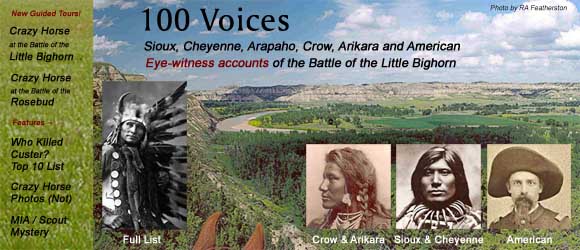
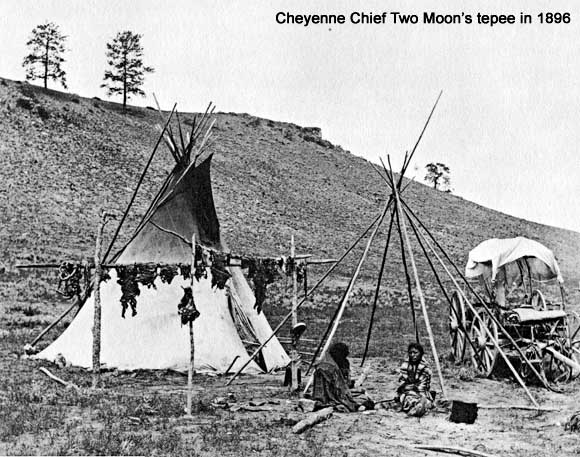
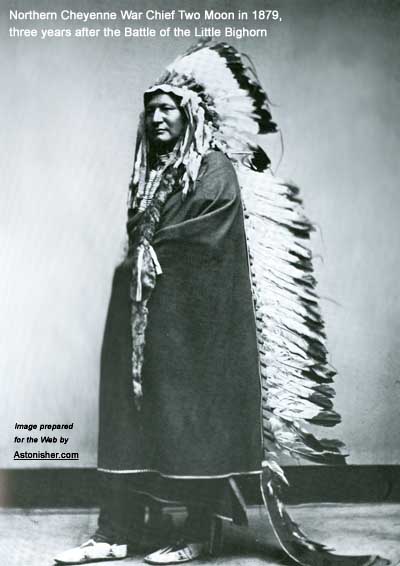 "About May, when the grass was tall and the horses strong, we broke camp and started across the country to the mouth of the Tongue River. Then
"About May, when the grass was tall and the horses strong, we broke camp and started across the country to the mouth of the Tongue River. Then 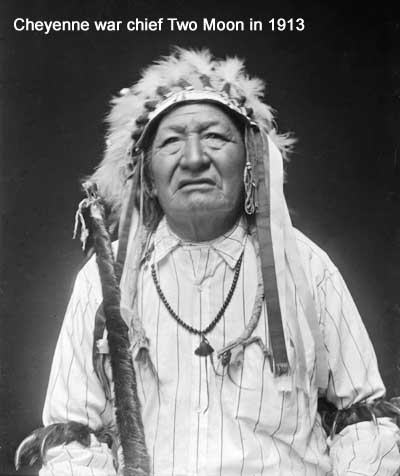 The old man paused and filled his pipe. His story was done. His mind came back to his poor people on the barren land where the rain seldom falls.
The old man paused and filled his pipe. His story was done. His mind came back to his poor people on the barren land where the rain seldom falls.
